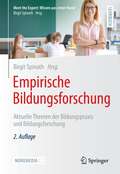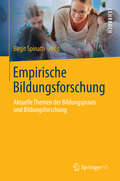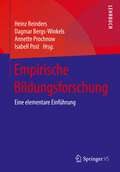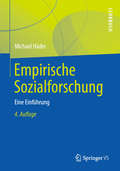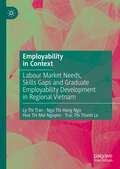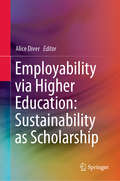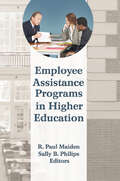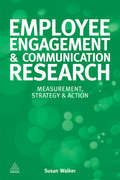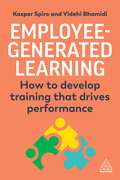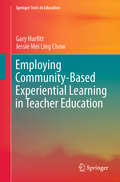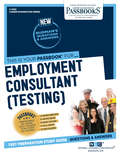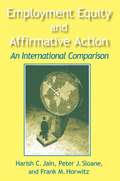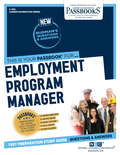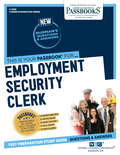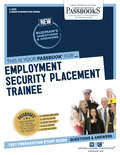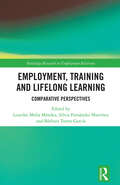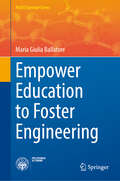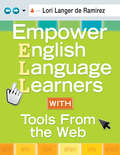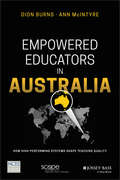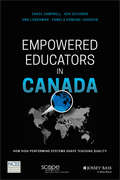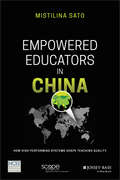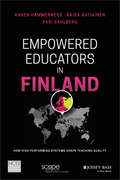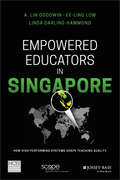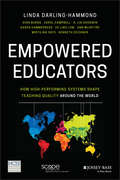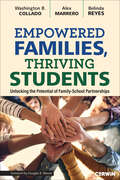- Table View
- List View
Empirische Bildungsforschung: Aktuelle Themen der Bildungspraxis und Bildungsforschung (Meet the Expert: Wissen aus erster Hand)
by Birgit SpinathSind Jungen die neuen Bildungsverlierer? Werden die Deutschen immer dümmer? Hat PISA die Schulen besser gemacht?Entscheiden sich die Richtigen für ein Lehramtsstudium?Diese und weitere Themen sind gesellschaftlich hoch relevant. Täglich berichten Medien über Bildung - mal mehr, mal weniger fundiert. Oft wird dabei ein überpointiertes, verzerrtes Bild gezeichnet, so dass es schwer ist, sich eine eigene Meinung zu bilden. Das vorliegende Buch greift aktuelle Themen aus Bildungsforschung und Bildungspraxis auf und stellt in kurzer, übersichtlicher Form den Forschungsstand dar. Sie lernen nicht nur die Fakten, sondern auch die Personen kennen, die sich diesen Fragen in Forschung und Praxis widmen. Zu diesem Zweck wurden Interviews mit Expertinnen und Experten geführt, die in diesem Buch nachzulesen sind, aber auch als Videos angeschaut werden können. Zu Wort kommen führende Bildungsforscherinnen und –forscher aus Psychologie, Erziehungswissenschaft, Soziologie und Bildungsökonomie.ZielgruppeDas Buch kann von allen mit Gewinn gelesen werden, die sich für Bildung interessieren. Studierende verschiedener Fachrichtungen, Referendarinnen und Referendare sowie Lehrerinnen und Lehrer finden in diesem Buch viele Themen, die ihre Arbeit direkt betreffen. Die Lektüre kann auch Grundlage für eine Seminargestaltung in Fächern sein, die sich mit Bildungsforschung beschäftigen (Psychologie, Erziehungswissenschaft, Soziologie, Bildungsökonomie, Empirische Bildungsforschung etc.). Durch den Interview-Stil ist das Buch angenehm zu lesen und daher auch als Freizeitlektüre geeignet.
Empirische Bildungsforschung: Aktuelle Themen der Bildungspraxis und Bildungsforschung (Meet the Expert: Wissen aus erster Hand)
by Birgit SpinathSind Jungen die neuen Bildungsverlierer? Werden die Deutschen immer dümmer? Hat PISA die Schulen besser gemacht?Entscheiden sich die Richtigen für ein Lehramtsstudium?Diese und weitere Themen sind gesellschaftlich hoch relevant. Täglich berichten Medien über Bildung - mal mehr, mal weniger fundiert. Oft wird dabei ein überpointiertes, verzerrtes Bild gezeichnet, so dass es schwer ist, sich eine eigene Meinung zu bilden. Das vorliegende Buch greift aktuelle Themen aus Bildungsforschung und Bildungspraxis auf und stellt in kurzer, übersichtlicher Form den Forschungsstand dar. Sie lernen nicht nur die Fakten, sondern auch die Personen kennen, die sich diesen Fragen in Forschung und Praxis widmen. Zu diesem Zweck wurden Interviews mit Expertinnen und Experten geführt, die in diesem Buch nachzulesen sind, aber auch als Videos angeschaut werden können. Zu Wort kommen führende Bildungsforscherinnen und –forscher aus Psychologie, Erziehungswissenschaft, Soziologie und Bildungsökonomie.ZielgruppeDas Buch kann von allen mit Gewinn gelesen werden, die sich für Bildung interessieren. Studierende verschiedener Fachrichtungen, Referendarinnen und Referendare sowie Lehrerinnen und Lehrer finden in diesem Buch viele Themen, die ihre Arbeit direkt betreffen. Die Lektüre kann auch Grundlage für eine Seminargestaltung in Fächern sein, die sich mit Bildungsforschung beschäftigen (Psychologie, Erziehungswissenschaft, Soziologie, Bildungsökonomie, Empirische Bildungsforschung etc.). Durch den Interview-Stil ist das Buch angenehm zu lesen und daher auch als Freizeitlektüre geeignet.
Empirische Bildungsforschung: Eine elementare Einführung
by Heinz Reinders Dagmar Bergs-Winkels Annette Prochnow Isabell PostDas Lehrbuch ist eine umfangreiche und gleichzeitig elementare Einführung, in der die Empirische Bildungsforschung in ihren Forschungsmethoden, theoretischen Zugängen und Untersuchungsfeldern aufbereitet wird. In kompakten und gut lesbaren Beiträgen von ausgewiesenen Fachexpertinnen und -experten wird in grundlegende Aspekte der Empirischen Bildungsforschung eingeführt. Ziel ist es, Studierenden einen Überblick über die ausgewählten Themen zu geben. Die Themenauswahl orientiert sich an gängigen Modulbeschreibungen grundständiger Studiengänge. Studierende in Lehramtsstudiengängen und angrenzenden bildungswissenschaftlichen Bereichen erhalten gesichertes Grundlagenwissen zu allen relevanten Themen in einem Band.
Empirische Sozialforschung: Eine Einführung
by Michael HäderSozialwissenschaftliche Methoden wie Befragungen, Beobachtungen und Inhaltsanalysen kommen in der Marktforschung, bei Studien zur Zeitgeschichte, in der Stadtplanung und in der Kommunikationsforschung zum Einsatz. Erst recht werden sie von Soziologen und empirisch arbeitenden Politikwissenschaftlern benötigt. Egal, ob im Rahmen der Evaluation eines Präventionsprogramms oder für die Erhebung des Gesundheitsverhaltens oder für eine Studie zur sozialen Mobilität, die sichere Handhabung des sozialwissenschaftlichen Instrumentariums ist stets die Voraussetzung, um belastbare Ergebnisse zu erzielen. Das Buch stellt wichtige Informationen für die Anwender und Entwickler dieser Instrumente zur Verfügung. Es behandelt die theoretischen Grundlagen der Methoden, die Schritte bei der Konzipierung und Umsetzung eines Projekts, die vielfältigen Varianten der Datenerhebung, die bei der Auswahl der Untersuchungseinheiten einzusetzenden Methoden ebenso wie die Prinzipien, die bei der Auswertung und Dokumentation der Befunde zu beachten sind. Mithilfe zahlreicher Beispiele gelingt eine besonders anschauliche Darstellung.In der vierten, aktualisierten Auflage hat im Rahmen der Auswahlverfahren nun auch das River Sampling Eingang gefunden, werden verstärkt auch digitale Methoden vorgestellt sowie vor dem Hintergrund der neuen Datenschutzverordnung auch die Forschungsethik und der Datenschutz aktualisiert.
Employability in Context: Labour Market Needs, Skills Gaps and Graduate Employability Development in Regional Vietnam
by Ly Thi Tran Truc Thi Le Hoa Thi Nguyen Nga Thi NgoThis book explores the issue of graduate employability in regional Vietnam. It provides a critical discussion of not only the demands of the labour market but also the practices and challenges in the development of graduate employability and career capacity building at the national, institutional and individual levels. It discusses graduate employability in Vietnam by analysing government and institutional policies and taking into account the perspectives and experiences of three key stakeholders: employers, graduates and universities. The book highlights the development of ‘employability in context’ for graduates in regional Vietnam to be able to adapt to the specific social, cultural and demographic conditions of the region and tackle new employment challenges.
Employability via Higher Education: Sustainability as Scholarship
by Alice DiverThis book discusses the topic of graduate employability from the premise that in this era of ‘massification,’ economic austerity, and political uncertainties, higher education (HE) no longer guarantees a clear ‘work place advantage.’ Divided into three sections, the book offers theoretical and philosophical discourses on the ‘HE quandary,’ whilst taking into account – and critiquing - political, temporal, and national contexts. It culminates in an investigation into specific discipline areas. It offers insights into the way that institutions, decision-makers, academics, and professional support staff can work together towards ensuring that our graduates are able to cope with the varied demands and challenges of modern job markets. It harnesses arguments and reflections on the breadth and depth of the functions of HE, such as social transformation, promoting principles of social justice, and providing opportunities. It grounds these in a triadic model for enhancing student engagement and holistic learning, namely, the emotional, cognitive, and behavioural aspects. As an anthology, it is forward-gazing in terms of the sustainability debate, whilst still offering evidence-based, research-grounded, practical suggestions to readers looking for tips and tools of the trade.
Employee Assistance Programs in Higher Education
by R. Paul Maiden; Sally B. PhilipsUnderstand the challenges faced by university based EAPs and the strategies to effectively meet needs-and discover what works and what does not Academia is a diverse workplace unlike any other, and subsequently, employee assistance program (EAP) issues are unique. Employee Assistance Programs in Higher Education focuses on the unique challenges of employee assistance service delivery in a university setting. This handy resource discusses the evolution, development, and strategies in managing an EAP in academia while comparing the substantial differences in program application between academic settings and corporate settings. Discussions include outsourcing, support groups, implementation of services, and effective model frameworks. Employee Assistance Programs in Higher Education explores in depth how the difference of being an academic institution influences the administration of an EAP. Reducing costs, assessing the value of an EAP, faculty resistance to accessing EAPs, organizational and interpersonal problems, manager support groups to reduce stress, developing &’soft skills&’, and addressing the deaths of faculty, staff, and students are examined in detail. This unique resource is extensively referenced and includes tables to clearly present data. Topics in Employee Assistance Programs in Higher Education include: the evolution of the IAEAPE university EAP response to traumas on campus enhancing faculty access university EAPs and outsourcing creating a specialized EAP program comparison between academic and corporate cultures case study of the University of Saskatchewan EAP and more! Employee Assistance Programs in Higher Education is a comprehensive resource for academic administrators; benefit plan managers; university based EAP managers and directors; EAP, work/life, and wellness professionals; members of International Association of Employee Assistance Professionals in Education; Employee Assistance Professionals Association; Employee Assistance Society of North America; Association of Work Life Professionals; Society for Human Resource Management Schools of Social Work; educators in schools of social work, psychology, counseling education, and business.
Employee Engagement and Communication Research: Measurement, Strategy and Action
by Susan WalkerThere's a well-known saying: what doesn't get measured doesn't get done. So it is no surprise that communicators, human resource and change managers and other professionals recognise the need to measure and evaluate their work, particularly its worth to their organization and seek the most effective ways to achieve this. Whether you're already involved in research, planning your first project or commissioning an external research company, Employee Engagement and Communication Research covers everything you need to know in order to conduct robust, reliable research. Whether it's a full-scale employee survey or research focusing on a particular subject area such as communication, engagement, change or corporate social responsibility, Employee Engagement and Communication Research is your essential guide covering all the tools, strategy and actions to make your project a success.
Employee-Generated Learning: How to develop training that drives performance
by Kasper Spiro Videhi BhamidiDeveloping learning materials has traditionally been a slow and costly process, with updates being a constant challenge. How can organizations counter this problem?Most companies adopt a learning strategy where content is created by a centralized learning and development (L&D) department, with no input from existing employees. This process is slow, expensive and makes it impossible to keep content updated. The solution is shifting content creation from a top-down approach to a bottom-up one, allowing employees to share their knowledge across the business. This approach is called Employee-generated Learning. Through it, L&D professionals have more time to focus on learning strategy and culture, analytics, ROI and addressing any knowledge gaps. This book is a practical guide that explains what Employee-generated Learning is, the benefits of this approach and how to implement it. It provides a framework for organizations of any size, enriched by detailed how-to's, industry insights and case studies from companies that have successfully implemented this bottom-up approach. Employee-Generated Learning covers the shift in learning trends from formal to informal learning and from theoretical learning to performance support. It outlines the performance, financial and productivity gains from kickstarting a knowledge-sharing culture. Most importantly, it is a practical manual on implementing Employee-generated Learning step by step. The book is ideal for all learning professionals looking to upskill their workforce at pace, capture the knowledge and experience of their staff and improve both individual and business performance.
Employing Community-Based Experiential Learning in Teacher Education (Springer Texts in Education)
by Gary Harfitt Jessie Mei ChowThis book positions itself at the intersection of the interrelationship between three key areas of initial teacher education: constructivist learning theories, teaching practicum, and the promotion of reflective practices. It presents an innovative approach to teacher preparation at undergraduate and postgraduate levels by critically examining the implementation of a mandatory experiential learning block across subject disciplines on undergraduate and postgraduate teacher preparation courses. This book presents multiple examples and case studies of these varied experiential learning projects that will inform academics, teachers and policymakers. Through these rich examples the authors set out to address the theory-practice dilemma in teacher education, where teachers-to-be are often positioned as ‘consumers’ of educational research in classrooms, read reference books and academic papers on teaching, and observe university and school experts before applying the same acquired theories and practices in their own classes. In the book the authors argue for a shift away from this conventional teacher-learning curriculum that is characterised by the separation of theory and practice, choosing instead to promote pedagogy and methods courses where practice underpins all learning. These pedagogical perspectives include the promotion of a diverse range of learning contexts (including on- and off-campus learning sites) for student teachers to experience during their time on teacher education courses.
Employment Consultant: Passbooks Study Guide (Career Examination Series)
by National Learning CorporationThe Employment Consultant (Testing) Passbook® prepares you for your test by allowing you to take practice exams in the subjects you need to study. It provides hundreds of questions and answers in the areas that will likely be covered on your upcoming exam.
Employment Equity and Affirmative Action: An International Comparison (Issues In Work And Human Resources Ser.)
by Peter Sloane Frank Horwitz Harish C. JainThe authors of this comparative study of affirmative action compare the employment practices of six countries: the U.S., Canada, Great Britain/Northern Ireland, India, Malaysia, and South Africa. They look at mandatory quota policies; legislated versus voluntary policies; goals and timetables; restrictions and other policies; as well as recruitment, selection, compensation, performance appraisal, promotion, training, and career development. Their findings will prove useful for training managers of companies with global operations.
Employment Program Manager: Passbooks Study Guide (Career Examination Series)
by National Learning CorporationThe Employment Program Manager Passbook® prepares you for your test by allowing you to take practice exams in the subjects you need to study. It provides hundreds of questions and answers in the areas that will likely be covered on your upcoming exam, including but not limited to: principles and practices of public administration, including office management, fiscal controls and staffing; economic development principles; personnel management; and other related areas.
Employment Security Clerk: Passbooks Study Guide (Career Examination Series)
by National Learning CorporationThe Employment Security Clerk Passbook® prepares you for your test by allowing you to take practice exams in the subjects you need to study. It provides hundreds of questions and answers in the areas that will likely be covered on your upcoming exam, including but not limited to: Name and number checking under time limitations; Filing; Coding; Understanding and interpreting written material; Interviewing; and more.
Employment Security Placement Trainee: Passbooks Study Guide (Career Examination Series)
by National Learning CorporationThe Employment Security Placement Trainee Passbook® prepares you for your test by allowing you to take practice exams in the subjects you need to study. It provides hundreds of questions and answers in the areas that will likely be covered on your upcoming exam, including but not limited to: Interviewing; Reading, Understanding, and applying complex written material; Preparing written material; Understanding and interpreting tabular material; and more.
Employment, Training and Lifelong Learning: Comparative Perspectives (Routledge Research in Employment Relations)
by Lourdes Mella Méndez Silvia Fernández Martínez Bárbara Torres GarcíaThis book offers a timely exploration of the continuous training of individuals, a subject crucial to both business competitiveness and societal progress in today’s rapidly changing world. Addressing the digital and climate revolutions, it examines how lifelong learning helps workers adapt their skills to meet evolving demands while supporting active ageing for all citizens, even in retirement.Divided into three sections, the book features studies that combine theoretical insights and practical recommendations from renowned experts in education and law. The book stands out for its international scope, with chapters covering diverse national perspectives from countries such as the United Kingdom, the United States, Japan and various European nations. It uniquely integrates both education and legal perspectives, providing a comprehensive analysis that addresses gaps in existing literature. Readers will benefit from clear, accessible language, proposals for key stakeholders (e.g., policymakers, social partners), and coverage of pressing issues like vocational training for immigrants, legal frameworks for non-formal learning and the impact of digital transitions on workforce development.This book is an essential resource for academics, researchers, advanced students, legal professionals, educators, policymakers, trade unions, and employer associations. It offers valuable insights for anyone involved in Labour Law, social security, vocational training or workforce development on a global scale.
Empower Education to Foster Engineering (PoliTO Springer Series)
by Maria Giulia BallatoreThis book highlights the pivotal role that engineering education researchers can play at technical universities. By delving into both theoretical and practical aspects, it showcases the transformative potential of integrating rigorous educational research into technical education. The book begins by outlining the current landscape of engineering education research and situates it within the unique context of the Italian educational system. This initial framework sets the stage for a detailed examination of the scope and limitations of the field. By understanding the experiences and challenges of both students and educators, the book bridges gaps and fosters an environment where educational practices are continuously improved and aligned with real-world demands. One of the key problems addressed is the disconnection often observed between educational theory and practical implementation. It provides actionable insights and recommendations that can help harmonize teaching methods with educational research findings. It offers strategies for enhancing student engagement, improving teaching methodologies, and ultimately producing graduates who are better equipped to meet the challenges of the engineering profession. This book serves as a valuable resource for educators, researchers, and policymakers dedicated to advancing the quality of engineering education, and by presenting a balanced analysis of students' and lecturers' perspectives, it offers a holistic view of the educational landscape and practical solutions for its improvement.
Empower English Language Learners With Tools From the Web
by Lori Langer de RamirezDiscover how Web 2.0 tools can advance English language learning! Today’s interactive Web tools offer teachers of English language learners a wealth of opportunities to inspire and motivate their students. Aligned with national TESOL standards, this user-friendly, research-based guide shows how Web 2.0 tools can improve English language proficiency and build 21st-century skills. Readers will find: Relevant descriptions of a wide range of Web tools, from blogs and podcasts to social networking and more Classroom-ready projects and tips for elementary, middle, and high school students Guidelines to support safe and appropriate Internet use
Empowered Educators in Australia: How High-Performing Systems Shape Teaching Quality
by Ann McIntyre Dion BurnsBEST PRACTICES FROM AUSTRALIA'S HIGH-PERFORMING SCHOOL SYSTEMS Empowered Educators in Australia is one volume in a series that explores how high- performing educational systems from around the world achieve strong results. The anchor book, Empowered Educators: How High-Performing Systems Shape Teaching Quality Around the World, is written by Linda Darling-Hammond and colleagues, with contributions from the authors of this volume. The authors of Empowered Educators in Australia take an in-depth look at the policies and practices surrounding teaching quality in two different states: New South Wales (NSW) and Victoria. NSW offers significant support for government schools in areas such as staffing and teacher professional development. Victoria operates a highly devolved school system. Each provides a contrasting view of how federal and state policies combine to shape learning outcomes for students in Australia. The interplay between state and federal policy characterizes an intriguing "centralizing decentralization." Initiatives to create national curricular, teaching, and teacher education standards all sit in balanced tension with a movement towards greater devolution of authority to schools. Together the NSW and Victoria case studies provide insights into policies that can support high-quality teaching in a federal education system. Australia's current educational reforms place increasing emphasis on issues of teaching quality, reshaping teaching as a standards-based, evidence-informed profession, and one that seeks to foster collegiality and professional exchange. These reforms encompass many aspects of a system that supports teaching quality, and highlight: the way teachers are trained, how they are inducted into the teaching profession and supported with mentors, the professional learning they receive, how they are appraised on their work, and the career pathways for teachers.
Empowered Educators in Canada: How High-Performing Systems Shape Teaching Quality
by Ann Lieberman Carol Campbell Ken Zeichner Pamela Osmond-JohnsonBEST PRACTICES FROM CANADA'S HIGH-PERFORMING SCHOOL SYSTEMS Empowered Educators in Canada is one volume in a series that explores how high-performing educational systems from around the world achieve strong results. The anchor book, Empowered Educators: How High-Performing Systems Shape Teaching Quality Around the World, is written by Linda Darling-Hammond and colleagues, with contributions from the authors of this volume. Empowered Educators in Canada details the core commonalities that exist across Canada with special emphasis on the localized nature of the systems—a hallmark of Canadian education. Canada boasts a highly educated population, and the provinces/territories truly value education as evidenced by the significant proportion of public funds allocated to schooling. Operated by the provinces and territories, participation in kindergarten, primary, and secondary education is close to 100% across the nation. In addition to offering traditional academics, secondary education includes opportunities for students to attend technical and vocational programs. To demonstrate exemplary education systems, the authors examine two top-performing jurisdictions, Alberta and Ontario, which have developed strong supports for teacher development. Canadian teachers are highly qualified, and salary scales in all jurisdictions are typically based on a teacher's level of education and years of experience. While Canada has enjoyed much educational success, the education of First Nations students has historically been one of the country's more controversial and contentious issues. Overall, Canada is a country that is proud of its education system and places a high value on—and participation in—publicly funded education.
Empowered Educators in China: How High-Performing Systems Shape Teaching Quality
by Mistilina SatoBEST PRACTICES FROM CHINA'S HIGH-PERFORMING SCHOOL SYSTEM Empowered Educators in China is one volume in a series that explores how high-performing educational systems from around the world achieve strong results. The anchor book, Empowered Educators: How High-Performing Systems Shape Teaching Quality Around the World, is written by Linda Darling-Hammond and colleagues, with contributions from the author of this volume. Empowered Educators in China describes the nation's policy reforms that built the modern Chinese educational system and the educational practices that are considered typical in China. The book spotlights Shanghai's system which is distinctive and superior. Shanghai offers a clear illustration of an educational system that continually invests in educating a diverse student population and, by measures of international comparison tests, is achieving outstanding results. Many factors contribute to the Shanghai system's ongoing success, including the students' motivation toward strong performance, the parental support for education that is culturally ingrained throughout the country, the focus that teachers place on high expectations for students, and the individual tutoring they provide. The author argues that these factors are only a partial explanation of Shanghai's success and then closely describes educational policies that support teachers' preparation, hiring, ongoing development, and opportunities for awards and leadership. These policies are based on the assumption that teachers are key to the nation's future and must be appropriately supported in order to contribute to student performance and achievement, an assumption that is also explicitly stated within Chinese law. This volume offers specific descriptions of how these national policies are translated, adapted, and enacted in Shanghai.
Empowered Educators in Finland: How High-Performing Systems Shape Teaching Quality
by Pasi Sahlberg Karen Hammerness Raisa AhtiainenBEST PRACTICES FROM FINLAND'S HIGH-PERFORMING SCHOOL SYSTEM Empowered Educators in Finland is one volume in a series that explores how high- performing educational systems from around the world achieve strong results. The anchor book, Empowered Educators: How High-Performing Systems Shape Teaching Quality Around the World, is written by Linda Darling-Hammond and colleagues, with contributions from the authors of this volume. Empowered Educators in Finland explores Finland's unique approach to teacher training that, combined with a national focus on equity and children, has led to strong student results on the OECD PISA and other international tests. Since the 1930s, every child born in Finland has been provided with a box of clothes, sheets, toys, diapers, and even a small mattress; the box itself can—and often does—serve as a simple crib. Intended to ensure that all Finnish children begin with the essentials, this box also serves as a clear symbol of the nation's emphasis on equality and opportunity. This book describes how what is commonly thought to be "just a part of Finnish culture" is actually the result of strong support for educators at all levels of government. From the Ministry of Education and Culture, to the Finnish National Board of Education, to regional and local policy makers, Finland has made deliberate choices to create and support a strong educational system. While there are unique political, cultural, and societal features of Finland—as with all countries—there are many lessons to be learned and practical ideas to be implemented across the world.
Empowered Educators in Singapore: How High-Performing Systems Shape Teaching Quality
by A. Lin Goodwin Linda Darling-Hammond Ee-Ling LowBEST PRACTICES FROM SINGAPORE'S HIGH-PERFORMING SCHOOL SYSTEM Empowered Educators in Singapore is one volume in a series that explores how high-performing educational systems from around the world achieve strong results. The anchor book, Empowered Educators: How High-Performing Systems Shape Teaching Quality Around the World, is written by Linda Darling-Hammond and colleagues, with contributions from the authors of this volume. Empowered Educators in Singapore delves into the country's rapid rise to educational excellence on a global scale and the national effort that drives it. Singaporean students routinely outperform their peers from around the world, placing first or second in international assessments, particularly in math and science. In 2015, Singaporean students topped the league table for both the Programme in International Student Achievement (PISA) and the Trends in International Mathematics and Science Study (TIMSS). With educators around the world clamoring for the "Singapore secret," the reality is that Singapore's excellence is the result of a 25-year drive to improve education through systemic, long-term and ongoing, consistent, and deliberative reform with an emphasis on teacher quality. This book describes the interwoven strategies that merge context, quality, governance, and continual evolution into a consistently high-achieving student population.
Empowered Educators: How High-Performing Systems Shape Teaching Quality Around the World
by A. Lin Goodwin Linda Darling-Hammond Ee-Ling Low Carol Campbell Ann McIntyre Dion Burns Karen Hammerness Mistilina Sato Ken ZeichnerDiscover how high-performing systems shape teaching quality around the world Producing highly skilled and committed teachers is not the work of a single innovative school or the aggregation of heroic individuals who succeed against the odds. In high-performing countries, the opportunities for teachers to learn sophisticated practices and continue to improve are embedded systemically in education policies and practices. Empowered Educators describes how this seemingly magical work is done—how a number of forward-thinking educational systems create a coherent set of policies designed to ensure quality teaching in all communities. . . and how the results are manifested in practice. Spanning three continents and five countries, Empowered Educators examines seven jurisdictions that have worked to develop comprehensive teaching policy systems: Singapore and Finland, the states of New South Wales and Victoria in Australia, the provinces of Alberta and Ontario in Canada, and the province of Shanghai in China. Renowned education expert Linda Darling-Hammond and a team of esteemed scholars offer lessons learned in a number of areas that shape the teaching force and the work of teachers, shedding unprecedented light on areas such as teacher recruitment, preparation, induction and mentoring, professional learning, career and leadership development, and more. Find out how quality teaching is developed and conducted across the globe Discover a common set of strategies for developing, supporting, and sustaining the ongoing learning and development of teachers and school leaders See how high-performing countries successfully recruit and train educators Understand why the sharing of expertise among teachers and administrators within and across schools is beneficial A fascinating read for researchers, policymakers, administrators, teacher educators, pre-service teachers and leaders, and anyone with an interest in education, this book offers a rare glimpse into the systems that are shaping quality teaching around the world.
Empowered Families, Thriving Students: Unlocking the Potential of Family-School Partnerships
by Washington Collado Alex Marrero Belinda ReyesBreak barriers, build trust, and create lasting change for students Family engagement has never been more critical to student achievement, yet too many schools remain stuck in outdated models that treat families as occasional visitors rather than essential partners. Authored by three seasoned and celebrated school leaders, this practical book challenges educators to move beyond traditional "meetings and meals" approaches toward authentic family empowerment that drives meaningful change. Introducing an innovative framework to reimagine family and community engagement, Empowered Families, Thriving Students addresses critical topics including overcoming deficit-based mindsets, establishing trust, building community partnerships, and reimagining traditional practices like parent-teacher conferences. Additional features include Fourteen implementable strategies, each supported by clear action steps and self-analysis questions Authentic vignettes drawn from the authors′ extensive experiences in PreK–2 schools across diverse communities Evidence-based approaches that combine nationally recognized research with compelling personal experiences A focus on equity and cultural responsiveness that specifically address the needs of schools serving low-income and multilingual students This exceptional guide provides school leaders, teachers, and community advocates with the essential tools to forge meaningful collaboration that focuses relentlessly on student achievement and wellbeing, creating stronger schools and more vibrant communities.
